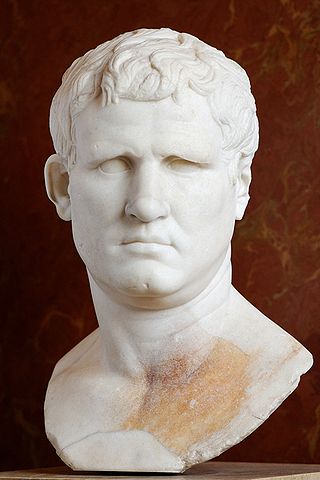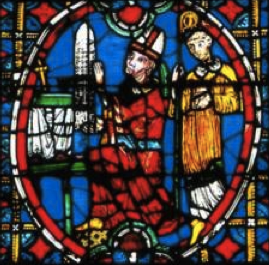Attestation

The only surviving direct attestations to Lucius are in inscriptions honoring his son Marcus where his filiation is present. For example on the Pantheon in Rome an engraving reads "M·AGRIPPA·L·F·COS·TERTIVM·FECIT": "M[arcus] Agrippa L[ucii] f[ilius] co[n]s[ul] tertium fecit" meaning "Marcus Agrippa, son of Lucius, made [this building] when consul for the third time". [3] [a]
Seneca the Elder makes indirect reference to Lucius when mentioning that Marcus often omitted his nomen "Vipsanius" from his name due to embarrassment for his father's low rank, [4] although many modern historians doubt the veracity of Seneca's claim and believe Marcus simply followed a trend common at the time to exclude nomina. Seneca's claim may have been influenced by negative propaganda. [5]
"Did the father of Marcus Agrippa, of whom nothing was known, even after Agrippa became famous, confer the greater benefit upon his son, or was the greater which Agrippa conferred upon his father when he gained the glory, unique in the annals of war, of a naval crown, and when raised so many wast buildings in Rome, which not only surpassed all former grandeur, but have been surpassed by none since?"
Seneca the Younger compares Lucius to Gryllus and Aristo the fathers of Xenophon and Plato as men who are only remembered forever due to the accomplishments of their sons. In essence he is an example to Seneca of a man who benefited from his son, but whose son did not benefit from him. Seneca even emphasizes that Lucius remained obscure even after Marcus success. [7] [8] As the text does not mention his name it is possible that Seneca did not even known Agrippa's father was named Lucius. [9]
In the past some historians such as Peter Schreiner Frandsen attempted to identify Lucius with a rhetorician named Vipsanius Atticus mentioned by Seneca the Elder as a student of Apollodorus of Pergamon. [10] This theory proposes based on the cognomen Atticus that Marcus was on his father's side in some way related to his father-in-law Titus Pomponius Atticus. This theory is flawed as Pomponius cognomen was not hereditary but derived from his personal relation to the region of Attica (near Athens). Both Meyer Reinhold and Jean-Michel Roddaz reject the theory in their respective books. [11] [12]
Cassius Dio mentions Lucius in his indices, [13] but says nothing about him. [11] The lack of further references to him makes Roddaz confident in believing that Lucius was not known in Rome at the time of Marcus career and that Lucius may even have died before his son rose to fame. [11]





